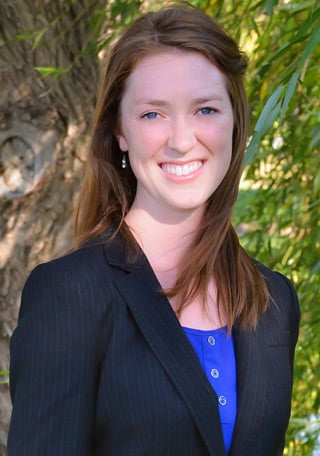After receiving degrees in political science and peace, justice and social change from Hastings College in 2014, California native Emily Johnson followed her food security and public policy passion and moved to the East Coast for a year-long fellowship with the Emerson National Hunger Fellows program.
 She followed that prestigious fellowship by being accepted into the Sanford School of Public Policy at Duke University – and this summer will be working for USAID’s Bureau of Food Security coordinating policy efforts surrounding food and security programs in Central and East Africa.
She followed that prestigious fellowship by being accepted into the Sanford School of Public Policy at Duke University – and this summer will be working for USAID’s Bureau of Food Security coordinating policy efforts surrounding food and security programs in Central and East Africa.
“I chose to focus on public policy because it combines research and evidence to advocate for change, and I want to help transform the ways that we address social issues in this country like hunger and poverty,” said Johnson. “I am fascinated by the intersections of power in systems and decision making, and public policy allows me to leverage these interests and my love of research to contribute to real and substantial change.”
In the Emerson National Hunger Fellows program, she was able to work for five months with a community-based organization. Afterwards, she met with other fellows in Washington, D.C., to share their experiences in training to serve anti-hunger and anti-poverty policy advocates and with working in non-profits and government agencies. This gave her the opportunity to work with food policy on a local and national level.
Sanford School of Public Policy
In August 2016, Johnson began working on her master’s degree in public policy at the Sanford School of Public Policy. She said the Sanford School intentional prepares students with the skills and frameworks needed in the policy world. She also fills her time by working as a graduate research assistant for the North Carolina Governor’s Office, working directly with the governor’s policy director.
“In this role, I conduct research and write memos on a variety of social and political issues in North Carolina,” she said.
She is also part of the student group called Bridging Communities, focused on fostering a connection between the Durham, North Carolina, community and public policy students. Students partner with community organizations for volunteer work throughout the semester. One of their current projects is focused on incorporating more racial equity training into the curriculum.
Johnson’s master’s program is expected to take two years. For her, it’s bittersweet.
“I wish I could stay forever and take all of the classes I’m interested in, but I also want to apply the skills and academic insight that I am learning to the real world,” Johnson said.
She feels she had a “huge advantage” of going to a small school like Hastings, where she was a Bronco Award winner and Creigh-Weyer Scholar.
“Hastings was instrumental for my learning, both in my previous work experience and at Duke,” she said. “My relationships with my professors and the intimate learning environment, especially in the Political Science department, instilled a curiosity and love of research that has continued to inform how I approach issues. I am able to navigate through different opportunities and advocate for myself and the goals that I have, and Hastings created a supportive and encouraging environment for me to practice those skills.”
Once she receives her master’s degree, Johnson plans to work in research and evaluation of government programs to connect research and policymaking.
“I want to work at a research organization or government entity that creates innovative approaches to increase access in international and domestic food systems,” she said. “Long-term, I would apply these various areas of expertise to be a policymaker and hold some sort of public office.”

